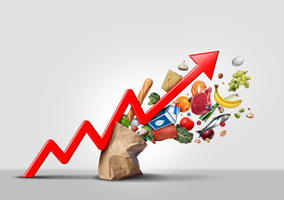Charities have called for urgent government action after Ofgem announced today that the typical household energy bill will increase to £3,549 a year from 1 October.
The cap set by the government energy regulator, which limits how much providers can charge customers in England, Scotland and Wales, is set to rise by 80% from it's current level of £1,971 for the average household.
Amid a cost-of-living crisis, charities said the government must step in to prevent millions of people from being pushed into poverty.
Sector bodies also warned that charities themselves are being hit by increased energy bills, while demand for their services is set to increase.
Turn2us: ‘Not acceptable to consign more than a quarter of us into poverty’
Thomas Lawson, chief executive of national poverty charity Turn2us, said: “Today’s meteoric rise in the energy cap will cripple those of us in the UK already struggling to stay afloat. This is no longer a choice between heating and eating, but not being able to afford either. This is as big an emergency as the impact of Covid and needs a similarly confident government response.
“As one of the wealthiest economies, it’s simply not acceptable to consign more than a quarter of us into poverty.”
The charity is calling on government to introduce a cap on energy costs and increase the value of Universal Credit and legacy benefits by a minimum of £25 a week, saying “the government must act now”.
Joseph Rowntree Foundation: This ‘will plunge many into destitution’
Katie Schmuecker, principal policy adviser at the JRF, said: “It is simply unthinkable that the price rises announced today can go ahead without further government intervention on a significant scale. To force the burden of rising wholesale energy prices onto households will plunge many into destitution.”
She added: “People are already being pushed into heart-breaking situations, disconnecting themselves from energy, skipping showers and going without food so their children can eat. And this is before we’ve even hit the big price rise and colder weather. Households are crying out for certainty and security.”
JRF research has found that almost half, 47%, of those on low incomes who are not in receipt of means-tested benefits are already going without one essential item or food, one third are in food insecurity and more than one fifth can’t afford to keep their home warm.
Groundwork: ‘We are alarmed at the volume of requests for help’
Graham Duxbury, Groundwork UK’s chief executive, said: “As a charity that supports people living in fuel poverty, we are alarmed at the volume of requests for help that are coming through.
“Energy companies, charities and independent experts all agree that the measures in place are not enough. As well as more emergency financial support and a long-term commitment to improving the energy efficiency of our homes we also need more – and better coordinated – advice.”
So far this year, Groundwork’s Green Doctors in Yorkshire have given out almost twice as many emergency fuel vouchers as in the whole of 2021-22. They have seen a 25% increase in fuel debt support requests and a 46% increase in people having mental health issues associated with stress from money issues.
The organisation said funding on some programmes has almost all been allocated, with four months left of the year, “before the cold weather begins and people start relying on their heating to stay warm and well”.
Centre for Ageing Better: ‘Already around 10,000 people die a year because their homes are too cold’
Carole Easton, Ageing Better’s chief executive, said: “Millions now face a long, cold and dangerous winter. Already around 10,000 people die a year because their homes are too cold. There is a clear and present danger that this number will rise significantly this winter without drastic measures.”
She said “immediate financial support is necessary” and “we also need government to take proactive and sustainable steps”.
Easton added: “UK homes are among the least energy efficient in Western Europe and the financial support government currently provides to homeowners to do something about this is insufficient. Four in five homes that are the coldest and are occupied by households on below-average incomes don’t even qualify for government support.”
Trussell Trust: ‘We have already seen a 50% increase in need at food banks’
Polly Jones, head of policy and research at the Trussell Trust, said the charity is “deeply concerned” that this “will be disastrous for people on the lowest incomes and will leave many with no option but to use a food bank”.
“In recent months, we have already seen a 50% increase in need at food banks compared to before the pandemic,” she said.
The charity is calling on the government to take immediate action and have joined together with 70 organisations to call for at least doubling the additional support offered to people on the lowest incomes.
“Furthermore, the government should provide better, long-term funding for local crisis support, so local authorities can provide much needed support directly in our communities. Only then will we be able to end the need for food banks in the future,” she added.
Family Fund: ‘The outlook is very grave’
Cheryl Ward, chief executive at Family Fund, said: “We know that current severe inflationary pressures are affecting millions of people across the land, but for families caring for disabled and seriously ill children, who have even greater costs, the outlook is very grave. The choices between putting food on the table, paying for energy or clothing and sensory equipment are stark”.
“We very much welcome this latest £150 payment from government,” said Ward, “but we know from the increasing calls we are now getting from our families, facing spiralling costs on every front, that more support will be needed. We are therefore, along with other charities, asking ministers to consider urgently how future support can be given.”
Pro Bono Economics: ‘Charity incomes are already feeling the squeeze on donations’
Nicole Sykes, policy and communications director at PBE, said: “Without further action, the new energy price cap leaves charities and many of the millions they support facing a dire financial situation heading into winter. Many of those who require support from charities are especially exposed to rising energy costs, particularly disabled people with conditions made worse by cold or needing energy to run lifesaving equipment.
“Charity incomes are already feeling the squeeze on donations as a result of the cost-of-living crisis. This hike in the energy price cap will only step up demand for charity services, while increasing charities’ own costs - particularly in older buildings with less insulation, and facilities offering energy intensive services like hydrotherapy.
“It is vital that the new prime minister acts fast with a package of support to hold back a wave of hardship, debt and destitution. But we also need a longer-term strategy for growth and economic security, to build up our national resilience to future shocks.”
NPC: ‘Destitute people can’t wait, it’s time to get on and give’
Dan Corry, chief executive at NPC, said: “Today's announcement confirms our worst fears. As we have been saying for some time, this cost-of-living crisis is going to be as big a threat to livelihoods and well-being as Covid-19 and a great deal worse for those at lower income levels. Many more people need help, yet charities will find it harder to support them as energy prices and soaring inflation increase their own costs and erode the value of their reserves and pre-pledged donations.
“Charities will undoubtedly strain every sinew not to let down the people they work with. But they need help.
“Of course, the government should do more and show the same courage it did during the pandemic with the furlough scheme and the Universal Credit uplift. But, as we said in our recent report on confronting this crisis, philanthropists and grantmakers also need to do everything in their power to help charities, and they should be doing it now. Destitute people can’t wait, it’s time to get on and give.”
CFG: 'At the same time charities will also be tackling their own rising costs'
Clare Mills, policy and communications director at Charity Finance Group, said: “October’s increase to the energy price cap will devastate the poorest families and plunge many more into poverty, fear and despair over the coming months.
“We call on the government to act urgently to bring back some element of hope for people, through providing direct support, particularly to those already living in real hardship and disadvantage.
“Our member charities are bracing themselves for another long and difficult winter where more people in distress will be reaching out to them for help. At the same time charities will also be tackling their own rising costs, perhaps against a background of decreasing donations.”
NCVO: 'The next prime minister must address this immediately'
Sam Mercadante, policy and insight manager at NCVO, said: “The raising of the energy price cap will have catastrophic consequences, particularly for people on low incomes and disabled people who do not have the option of reducing energy usage.
“Our members are directly supporting those affected, whilst also dealing with the pressures of un-capped energy prices and decreased spending power on their already depleted finances. The next prime minister must address this immediately or see thousands more plunged into poverty, with charities unable to support them.”
Related Articles












